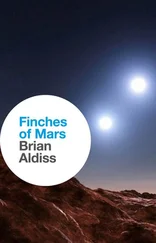Brian Aldiss - White Mars
Здесь есть возможность читать онлайн «Brian Aldiss - White Mars» весь текст электронной книги совершенно бесплатно (целиком полную версию без сокращений). В некоторых случаях можно слушать аудио, скачать через торрент в формате fb2 и присутствует краткое содержание. Год выпуска: 1999, ISBN: 1999, Издательство: Little, Brown UK, Жанр: Фантастика и фэнтези, на английском языке. Описание произведения, (предисловие) а так же отзывы посетителей доступны на портале библиотеки ЛибКат.
- Название:White Mars
- Автор:
- Издательство:Little, Brown UK
- Жанр:
- Год:1999
- ISBN:0-316-85243-0
- Рейтинг книги:5 / 5. Голосов: 1
-
Избранное:Добавить в избранное
- Отзывы:
-
Ваша оценка:
- 100
- 1
- 2
- 3
- 4
- 5
White Mars: краткое содержание, описание и аннотация
Предлагаем к чтению аннотацию, описание, краткое содержание или предисловие (зависит от того, что написал сам автор книги «White Mars»). Если вы не нашли необходимую информацию о книге — напишите в комментариях, мы постараемся отыскать её.
White Mars — читать онлайн бесплатно полную книгу (весь текст) целиком
Ниже представлен текст книги, разбитый по страницам. Система сохранения места последней прочитанной страницы, позволяет с удобством читать онлайн бесплатно книгу «White Mars», без необходимости каждый раз заново искать на чём Вы остановились. Поставьте закладку, и сможете в любой момент перейти на страницу, на которой закончили чтение.
Интервал:
Закладка:
Although I was in agreement with this statement, I got Dreiser back on track again by asking what all this had to do with Olympus’s extinction of the rest of Martian life.
“No, no, you have the wrong picture in your head still, Tom. That’s not what happened here, as we envisage it. There was no extinction.”
He paused before continuing, perhaps considering how to explain most clearly.
“With the very different conditions on Mars, the balance of advantage in evolutionary processes was also different. Even on Earth, two types of evolutionary pressure have been important. We have become accustomed to considering the idea of competition as being the more important. This may be because Darwin’s splendid perceptions were launched in 1859 into a highly competitive capitalist society.
“In the competition scenario, the different species battle it out, and the ‘fittest’ are, on the whole, the ones that survive. But the cooperative element in evolution has sometimes proved important—vital, you might say—as we’ve seen in the instances of symbiotic development I have already mentioned.
“On Earth, competitive aspects of evolution have rather dominated the cooperative elements in our consideration. Our enforced social competitiveness has led us in that direction. We tend to think that the competitive element predominates, although in fact the entire terrestrial biomass works in unconscious cooperative ways to create a favourable environment for itself.
“These cooperative processes stem from the early days when life first crept from sea to the land. Initially both land and atmosphere were hostile to life of any kind, and various symbiotic relationships had to be adopted. Otherwise life could not have survived. But gradually, as conditions on Earth became more favourable, competitive elements began to assert themselves. We now see—or think we see—the competitive elements dominating the cooperative elements.”
Somewhere in the audience, a tammy began to chirp and was hushed. I asked Hawkwood if evolution had taken a different course on Mars.
“Possibilities for life here differ considerably from Earth, as we have said. Conditions have never been other than harsh. Now they weigh heavily against life. We have low atmospheric pressure, almost zero oxygen content, abnormally dry conditions. But basic natural laws always applied.
“In the case of evolution, cooperation had a distinct edge over competition. In the early days of Mars’s history, conditions more closely resembled Earth’s. But gradually oxygen became bonded into the rocks while water vapour leaked away. As conditions became more and more adverse, cooperation among the indigenous life forms won out over competition.
“The enormous diversity of life forms, such as we find on Earth, never had a chance to develop here. Evolution on Mars was forced into a combining together of life. All forms eventually huddled together for protection against adverse Martian conditions. It was the ultimate Martian strategy.”
They huddled together, I suggested, under what we have always thought was a volcano, Olympus Mons. Why should they have chosen that particular shape?
“A cone shape is economical of material. And since the life forms were not going to be particularly mobile, they chose a defence readily adopted by countless of Earth’s creatures—they opted for camouflage. Camouflage against what we can’t tell; nor, I suppose, could they. But their instincts are readily understandable. In fact, the shell is just that, a shell made from keratin and clay—very tough and durable.”
It would keep heat in, I suggested.
“Yes, and fairly large meteorites out.”
A child’s voice from the audience asked, “What are the people like under the shell, Dreiser?”
They aren’t people in our sense of the word,” Dreiser replied. “The use of keratin as a binder in the shell suggests hair, nails, horns, hooves, feathers…”
At the words “hooves, feathers…” a frisson ran through the audience like the rustling of great wings.
Dreiser continued. “Olympus Mons—sorry, Kathi, Chimborazo—has grown gradually into the vast volcano shape we know today. The creatures under it must be still surviving, perhaps even thriving, since Olympus is now in a growth phase. It extends very slowly, we think upwards. But our surveys indicate an expansion of something like 1.1 centimetres every other decade.”
So how did it feed?
“Its exteroceptors suck nourishment and moisture from the rocks.
“As you have heard from Kathi here, Chimborazo is executing a slow horizontal movement. It advances at the rate of a few metres every Martian year.”
At the exclamations from his audience, Dreiser looked gravely ahead of him. He spoke next with emphasis.
“This advance began only when these domes and the science unit were established. Chimborazo is probably attracted by a heat source.”
“You mean it’s advancing on us?” cried a nervous voice from the floor.
“Although its forward movement is much faster than its growth rate, it is still no speedster by terrestrial standards. A snail runs like a cheetah by comparison. We’re all quite safe. It will take nearly a million years to drag itself here at present rate of progress.”
“I’m packing my bags now,” came a voice from the floor amid general laughter.
Vouchsafing the remark a wintery smile, Dreiser continued, “We monitored the horizontal movement first. You may imagine our incredulity. We did not immediately realise we were dealing with a living thing—undoubtedly the biggest living thing within the solar system.
“We did not connect it at first with those white exteroceptors, which flick so quickly out of sight. They are the creature’s sensors, and of complex function. Not eyes exactly. But they appear to be sensitive to electromagnetic signals of various wavelengths. The multitude of them together is probably used to build up a picture of sorts. They retract at any unexpected signal, which caused us problems in getting a clear picture of them to start with.”
A subdued voice asked a question from the audience. Dreiser needed it repeated: “I can’t believe what you’re telling us. How can that enormous thing possibly be alive?”
Kathi answered sharply. “You must improve your perceptions. If it can think, Chimborazo is probably asking itself how a small feeble bipedal thing like you could possibly be alive—not to mention intelligent.”
The questioner sank back in her chair.
“You can perhaps imagine our shock when we discovered that Chimborazo was advancing towards our research unit. Nothing can stop its approach,” Kathi said. “Unless we make some sort of conscious appeal to it…”
I asked if Dreiser thought that Olympus had a mind anything like ours.
“The balance of opinion is that it has a mind radically different from ours. So Kathi has half persuaded us. A mind compounded of a multitude of little minds. Thought may be greatly slowed down by comparison with our time-scales.
“Yes, I have to say it may well have awareness, intelligence. We have detected a fluttery CPS—the clear physical signal that is the signature of mind. It may tick over slowly by our standards, but speed of thought isn’t everything.”
“Now you’re being anthropomorphic!” said a voice from the floor.
“It is one of the functions of intelligence to respond discriminatingly to the events that come within its scope. Which is what Olympus seems to be doing. Its response to mankind’s arrival here is to move towards us. Whether this can be construed as hostile or friendly, or merely as a reaction to a heat source, we have yet to decide. It has decided!”
He paused for thought. “It may well have consciousness. Consciousness is not necessarily the gift solely of earthly beings such as ourselves.
Читать дальшеИнтервал:
Закладка:
Похожие книги на «White Mars»
Представляем Вашему вниманию похожие книги на «White Mars» списком для выбора. Мы отобрали схожую по названию и смыслу литературу в надежде предоставить читателям больше вариантов отыскать новые, интересные, ещё непрочитанные произведения.
Обсуждение, отзывы о книге «White Mars» и просто собственные мнения читателей. Оставьте ваши комментарии, напишите, что Вы думаете о произведении, его смысле или главных героях. Укажите что конкретно понравилось, а что нет, и почему Вы так считаете.










